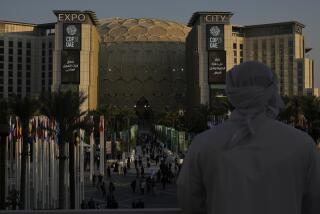NEWS ANALYSIS : Bush Wins Boffo Reviews; Modest Agenda, Tact Cited
- Share via
PARIS — At the economic summit that ended here Sunday, as in his visit to Poland and Hungary that immediately preceded it, President Bush remarked pointedly several times that he was speaking from the heart, not from note cards.
The contrast with his predecessor, Ronald Reagan, who routinely read from cards during his highly scripted presidency, was obvious. In his first meeting with the heads of the six other leading industrial democracies, Bush clearly established himself as the vigorous and forceful President of the largest democracy of all.
The reviews were boffo. French President Francois Mitterrand praised Bush as “a man of great openness and great courtesy in personal relations.” Mitterrand, who attended eight summits with Reagan, said Bush “showed a desire to achieve good understanding” of issues.
Milan’s conservative daily Il Giornale declared: “Bush earned his stripes as the leader of the Free World.” Tokyo’s mass-circulation Yomiuri Shimbun noted that Bush had made the summit focus on Eastern Europe. In Paris, French TV-1 called the proposal on Eastern Europe “an unprecedented initiative.”
As Canadian Foreign Minister Joe Clark noted, however, Bush’s success hinged in part on the fact that his wish list for the 1989 summit was so modest.
The President displayed the same instinct for conciliation and compromise that has marked the first six months of his tenure on domestic issues. But just as in Washington, he has purchased consensus by trimming back some of his goals.
At several earlier summits, the United States went to the table with major demands--and usually won them. In 1978, Jimmy Carter pressured reluctant West Germany and Japan into stimulating their economies to boost their purchases of U.S. exports. And in 1986, Reagan won the summit’s strong condemnation of Libyan leader Col. Moammar Kadafi and a joint commitment to work harder against state-sponsored terrorism.
This time, Bush had a more limited agenda, and he stopped short of pressing for everything on it. On Eastern Europe, his most heartfelt issue, he sought a clear commitment from West Germany and Japan to increase their aid to Poland and Hungary--but when West German Chancellor Helmut Kohl pressed to restrict the action to a call for a meeting of experts, Bush quickly agreed.
Praise From Diplomats
Modest as his agenda may have been, Bush’s performance was generally praised by other diplomats.
Several said they were impressed by Bush’s knowledge of foreign affairs and his low-key and relaxed style of dealing with other leaders. They implied that they found Bush a welcome contrast to Reagan, who during eight summits was never regarded as especially knowledgeable in foreign affairs and was considered formal and rather aggressive in pushing his own agenda.
After watching Bush in action here, a French diplomat turned to a senior State Department official and said, “It’s nice to have a summit where all the leaders can read and write.”
Reagan came into office with virtually no experience in foreign affairs, while Bush has had years of experience in a variety of top federal posts involving international issues.
Also, Reagan showed little interest in discussing foreign affairs with other leaders. By contrast, diplomats found Bush to be a good listener who was willing to engage in in-depth discussions.
Enjoys Give and Take
Unlike Reagan, who pretty much stuck to the script written by his aides for formal discussions, Bush enjoys the give and take of less structured settings at sessions such as the economic summit.
Referring to himself in his Sunday press conference as “the new boy, the new kid in school,” Bush said that what he found most interesting at the summit was “the unstructured part, the part where you sit with these other leaders, tell them what you think, listen carefully to what they think.”
Demonstrating the kind of self-assuredness that impressed diplomats here, he said he would like to see more emphasis placed on “that kind of interaction” in the future. Next year’s summit is scheduled to be held in the United States.
Personal Ties Help
Personal ties to many members of diplomatic delegations here who are longtime friends or acquaintances of Bush--dating back to his days as U.N. ambassador, envoy to China, CIA director and vice president--also have played a crucial role in his diplomacy.
At a reception here, Michele Legendre, wife of French Premier Michel Rocard, rushed up to Walter J. P. Curley, the U.S. ambassador to France and himself a friend of Bush’s for many years, and asked where she would be able to see the President; “He’s a friend of mine,” she said.
“They feel very comfortable with him,” said Curley. “He has a penchant for making friends.”
Another Bush acquaintance, Canada’s Clark, said: “President Bush performed to great effect. This is his first summit, but it was far from being his first exposure to foreign affairs. He comes as close to (being) an expert as you can get.”
Bush’s relaxed style apparently contributed to a lack of the tension that has marred some previous summits.
For the first time, the summit issued a major statement on the need for international cooperation in protecting the environment, a subject that apparently held little interest for Reagan.
For Bush, by contrast, the environment has long been a subject of major interest. Said Clark: “It’s clear that Mr. Bush is more inclined to cooperate with the other leaders on the environmental question.”
Times staff writers Rone Tempest and Doyle McManus contributed to this story.
More to Read
Get the L.A. Times Politics newsletter
Deeply reported insights into legislation, politics and policy from Sacramento, Washington and beyond. In your inbox twice per week.
You may occasionally receive promotional content from the Los Angeles Times.










